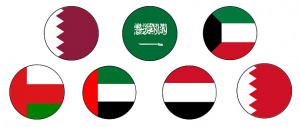Language/Gulf-arabic/Grammar/Negation
Hi Gulf Arabic learners! 😊
In this lesson, we will learn how to negate sentences in Gulf Arabic. Negation is an essential part of language learning, and in Gulf Arabic, negation is done in different ways depending on the sentence structure. So, let's get started and learn how to negate in Gulf Arabic.
Consider broadening your understanding by checking out these related lessons: How to Use "Have", Questions & Adjectives.
Basic Negation[edit | edit source]
In Gulf Arabic, basic negation is done by using the word "ما" (ma), which means "not". The word "ما" (ma) is added before the verb to negate the sentence. For example:
| Gulf Arabic | Pronunciation | English |
|---|---|---|
| ما أنا طالب | ma ana tālib | I am not a student. |
In the example above, the word "ما" (ma) is added before the verb "أنا طالب" (ana tālib) to negate the sentence "I am a student".
Let's see another example:
| Gulf Arabic | Pronunciation | English |
|---|---|---|
| ما تكلم العربية | ma tukallim al-ʻarabīyah | He/She does not speak Arabic. |
In the example above, the word "ما" (ma) is added before the verb "تكلم العربية" (tukallim al-ʻarabīyah) to negate the sentence "He/She speaks Arabic".
Negation with Pronouns[edit | edit source]
In Gulf Arabic, negating pronouns is done by using the word "لا" (lā), which means "no" or "not". For example:
| Gulf Arabic | Pronunciation | English |
|---|---|---|
| لا أنا | lā ana | No, I am not. |
In the example above, the word "لا" (lā) is used to negate the pronoun "أنا" (ana), which means "I".
Let's see another example:
| Gulf Arabic | Pronunciation | English |
|---|---|---|
| لا هم | lā hum | No, they are not. |
In the example above, the word "لا" (lā) is used to negate the pronoun "هم" (hum), which means "they".
Negation with "ما في"[edit | edit source]
In Gulf Arabic, the phrase "ما في" (ma fī) is used to express negation. The phrase "ما في" (ma fī) means "there is not" or "there are not". For example:
| Gulf Arabic | Pronunciation | English |
|---|---|---|
| ما في شيء | ma fī shay' | There is nothing. |
In the example above, the phrase "ما في" (ma fī) is used to negate the sentence "There is something".
Let's see another example:
| Gulf Arabic | Pronunciation | English |
|---|---|---|
| ما في أحد | ma fī 'aḥad | There is no one. |
In the example above, the phrase "ما في" (ma fī) is used to negate the sentence "There is someone".
Dialogue[edit | edit source]
- Person 1: ما كنت أفهم || (I did not understand)
- Person 2: ما في شيء صعب || (There is nothing difficult)
- Person 1: لا هم يساعدونني || (No, they are not helping me)
- Person 2: لا تشكرني || (No, don't thank me)
Culture and Interesting Facts[edit | edit source]
- In Gulf Arabic, it is common to use the phrase "مو شيء" (mū shayʼ), which means "nothing", instead of "لا شيء" (lā shayʼ) to express negation.
- In some Gulf countries, such as Kuwait and Bahrain, people tend to use the phrase "ما شاء الله" (mā shāʼ Allāh), which means "God has willed it", as a way of deflecting a compliment.
- In Gulf culture, it is considered impolite to say "no" directly. Instead, people tend to use euphemisms or deflect the answer. For example, instead of saying "no, I can't do that", they might say "I'll try my best".
Practice Exercises[edit | edit source]
1. Translate the following sentence to Gulf Arabic: "I am not hungry." 2. Translate the following sentence to Gulf Arabic: "She does not like fish." 3. How do you negate "you" in Gulf Arabic? Write an example sentence. 4. How do you express negation with the phrase "ما في" (ma fī) in Gulf Arabic? Write an example sentence.
Sources[edit | edit source]
➡ If you have any questions, please ask them in the comments section below.
➡ Feel free to edit this wiki page if you think it can be improved. 😎
Other Lessons[edit | edit source]
- Plurals
- Give your Opinion
- How to Use Have
- How to Use Be
- Pronouns
- Conditional Mood
- Adjectives
- Questions
- Personal Pronouns

